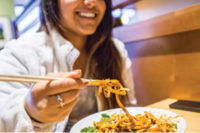Tea Bolsters Restaurant Sales
The $20 billion foodservice tea market will likely have an edge in future growth momentum

American restaurants have built an empire on the strength of consumer demand for coffee. And while coffee will continue to boost industry sales, it's the $20 billion foodservice tea market that likely will have the edge in future growth momentum as sales are expected to increase through 2018 and beyond. The forecast was predicted by market research publisher Packaged Facts in the recent report, Foodservice Tea Market Trends in the U.S.
By a wide margin, tea drinkers say great taste is the most important factor in deciding to get a tea drink at a restaurant. But taste also has a high degree of correlation to quality and flavor preference. Indeed, flavor enhances the mild taste of most tea drinks, so it's understandable that getting a specific flavor would influence nearly 3 out of 10 tea drinkers.
Restaurant tea choice is also influenced by a myriad of factors, such as price, time of day, temperature, convenience and health—each draw at least a 15% response rate as a "most" important choice influencer based on Packaged Facts' consumer survey. Bottom-dwellers include brand, fair trade, organic and trying something new/different. This range of restaurant tea choice influencers can present a challenge for restaurant marketers and menu developers to creating a menu to sate all demands. However, operators can ensure that at least a few quality teas are available in universal flavor preferences for both hot and cold consumption. Trends clearly point to variety and flavor expansion to create a more interesting tea menu.
Restaurant tea choice influencers shift among various demographic profiles, with age, gender, household income, and race/ethnicity emerging as most influential. For example, men age 18-54 much more likely to claim that fair trade, organic, and healthfulness influence their decision when deciding to get a tea drink at a restaurant, which suggests that men likely associate these attributes with better taste and higher quality. Notably, they are less influenced by getting a specific flavor, which suggests they may be more included to tea attributes than a specific taste profile. But some men may also perceive flavored tea as less masculine, presenting a purchasing stumbling block. AriZona maintains its association with golf legend Arnold Palmer, while its packaging—with checkerboard design and bold colors—also skews towards the more masculine, which may help drive sales to this demographic. The takeaway for restaurant operators is that when developing tea menu offerings, retaining pure tea drinks that aren't sweetened or flavored is important. Operators can also leverage menu descriptors such as strength, power, energy, fitness, and focus.
Looking for a reprint of this article?
From high-res PDFs to custom plaques, order your copy today!





